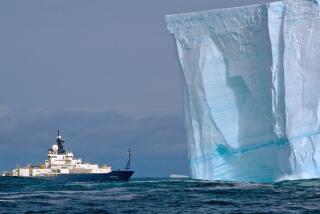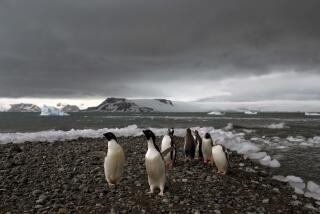Antarctica: Mining the White Space
- Share via
ST. IGNATIUS, MONT. — Like the moon, Antarctica is a harsh mistress. Like the moon it is inhospitable, remote, dazzling and full of illusion and mystery. Antarctica is so like the moon that the National Aeronautics and Space Administration studies the effects of its isolation on the people who spend winters there. So like the moon that scientists and construction workers going there wonder if the Earth will still be OK when they come back. So like the moon in its silent cleanliness that anything civilization does there becomes a caricature of civilization itself. So it was a matter of considerable importance to the world when the nations that govern Antarctica, through a curiously ambiguous treaty, announced in early June having finally agreed on terms that may allow private companies to mine the continent’s unknown riches.
Negotiations for this agreement were conducted so quietly over the past six years that the announcement came out of the blue like a rocket.
Mine Antarctica? This pristine land of snow and ice where Robert Falcon Scott suffered so nobly, where Roald Amundsen conquered so swiftly, where Admiral Richard E. Byrd planted the flag of international good will and scientific exploration? Will we suddenly see this beautiful place scuffed by industry and hazed over by soot? Will this white sheet of paper over which our pen is poised reveal us as the ultimate destroyers of all things beautiful that we touch?
Not necessarily.
The new agreement is far from an accomplished fact. It must still be ratified by 16 of the 20 nations that hold voting rights under the Antarctic Treaty System--among them the Soviet Union, the United States, China, India, Brazil, Chile; the list is remarkable for its diversity. A similar, less controversial measure took two years to be fully ratified. During the next years the new agreement is likely to come under attack from several sides, and could possibly succumb to the kind of death that met the SALT II agreement on arms, which involved only two nations.
Once the agreement is in place, only certain areas of Antarctica can be opened to prospecting with the unanimous approval of those 20 nations. After that, development is regulated by a commission made up of representatives from 10 of the nations. Then, of course, someone has to find something so valuable that it will be worth the unparalleled costs of mining or drilling in the earth’s most hostile landscape. Nowhere, not even the North Slope of Alaska or the Siberian Arctic coast, is as hard to work as Antarctica.
But even if the agreement soars over these hurdles, it may not mean disaster for the Antarctic environment. Those who care about the future of Antarctica, and, by extension, the world, must be looking at this fat concoction of legalese with mixed emotions: it gives and takes away, leaving the future as shimmering and unclear as a distant mountain range. .
The new agreement does one wonderful thing: It preserves the ambiguous glory of the Antarctic Treaty System, which went into effect in 1961. People who go south love Antarctica for its stark beauty, but also for the freedom and friendship that exists there between nations. Without passports you can travel between the bases of nation after nation and make friends in a dozen languages. There are no weapons, no property lines, no national boundaries, no turnstiles--no wars. Although seven of the 20 voting parties to the treaty claim pieces of Antarctica while the rest deny claims, peace is made possible by a clause in the Antarctic Treaty that intentionally sidesteps the thorny problem of sovereignty. The new agreement takes the most difficult aspect of that dodge--the question of how to offer title to minerals without having ownership vested in a nation--and resolves it to the apparent satisfaction of claimant and non-claimant state alike. So for now the treaty seems destined to survive.
The new agreement does one sad thing: It makes pure science less dominant on the continent. For 30 years under the Treaty System, Antarctica has been a preserve of science, where people went simply to learn about their planet. Although scientific exploration was always mingled with some political strutting by all the nations involved, it remained at least the titular head of state. Now science may share that position with prospecting, thereby perhaps eroding some of the openness and friendship that exists today. The first time a base leader hides his work from a visiting scientist will be a sorrowful moment in Antarctica.
The environmental organization Greenpeace, now maintaining a year-round base in Antarctica, will be fighting the agreement as it makes its tedious way toward ratification. Greenpeace wants to see Antarctica become a world park. That goal seems to be an ideal solution to both the problems of sovereignty and the preservation of the pre-eminent role of science. But this opposition is a risky business.
If the agreement fails, the possible outcome forks two ways. It could lead the treaty nations to establish something like a world park, resolving most of the conflicts--although it would not slake the eagerness many nations seem to have for discovering new wealth, illusive as it may be. But it could lead to the collapse of the treaty system and the sudden assertion of sovereignty, with an immediate conflict between nations claiming overlapping sections, particularly Argentina, Chile and the United Kingdom. War would be a remote but frightening possibility--a horrible war staining all that whiteness and, for centuries, glaciers would weep blood.
Shuttling from base to base in Antarctica offers a glimpse of an idealized world rich with cultural diversity but free of borders: Russians and Chileans living side by side in friendship; Brazilians playing soccer with Poles for the prize of a cup made of aluminum foil; South Koreans and Chinese communists discussing sewage disposal over lunch on a Greenpeace ship.
It seems naive to hope that something similar could develop elsewhere in the world. But this agreement, which offers a kind of property without sovereignty, gives us the chance to see if commerce, the engine of civilization, can mold itself to this new type of international relationship. In balance, the continent has become a symbol of bravery and restraint.
Although whaling and sealing pushed animals to near extinction, the harvest has been voluntarily curtailed. Fur seals have returned and whales may come back.
Although nations conducted military maneuvers in Antarctica before the treaty was signed, they have since backed away from posturing in favor of cooperation.
Although human outposts in Antarctica have brought pollution to a clean place, most newer bases are extremely careful about their waste--and many older ones are cleaning up the mess.
Over all, the tabula rasa of Antarctica reveals more good will than evil. As this new agreement brings commerce to the continent, it will offer both threat and promise to that record. As always, the decision is ours, and the reflection in the ice will be of the face of civilization we choose to show.
More to Read
Sign up for Essential California
The most important California stories and recommendations in your inbox every morning.
You may occasionally receive promotional content from the Los Angeles Times.













